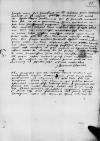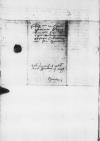Letter #616
Ioannes CAMPENSIS (Jan van CAMPEN) to Ioannes DANTISCUSLeuven (Lovanium), 1531-04-18
| received Ghent (Gandavum), [1531]-04-21 Manuscript sources:
Auxiliary sources:
Prints:
| ||||||||||||||
Text & apparatus & commentary Plain text Text & commentary Text & apparatus
Reverendissimo in Christo Patri, domino
Scripsi intra dies paucissimos me non dubitare, quin acceperis Ecclesiasten et psalmos aliquot selectos. Tradideram eos cuidam Magnifico
Vale, Domine mi.
Tuus modis omnibus
Postscript:
Hic


 AAWO, AB, D. 3, f. 45v
AAWO, AB, D. 3, f. 45v